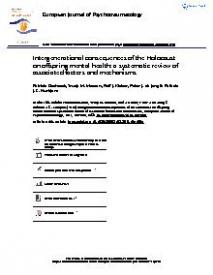Intergenerational consequences of the Holocaust on offspring mental health : a systematic review of associated factors and mechanisms
Exposure to war and violence has major consequences for society at large, detrimental impact on people’s individual lives, and may also have intergenerational consequences. To gain more insight into these intergenerational consequences, research addressing the impact of the Holocaust on offspring is an important source of information. The aim of the current study was to systematically review the mechanisms of intergenerational consequences by summarizing characteristics in Holocaust survivors and their offspring suggested to impact the offspring’s mental health. We focused on: 1) parental mental health problems, 2) (perceived) parenting and attachment quality, 3) family structure, especially parental Holocaust history, 4) additional stress and life events, and 5) psychophysiological processes of transmission. We identified 23 eligible studies published between 2000 and 2018. Only Holocaust survivor studies met the inclusion criteria. Various parent and child characteristics and their interaction were found to contribute to the development of psychological symptoms and biological and epigenetic variations. Parental mental health problems, perceived parenting, attachment quality, and parental gender appeared to be influential for the mental well-being of their offspring. In addition, having two survivor parents resulted in higher mental health problems compared to having one survivor parent. Also, there was evidence suggesting that Holocaust survivor offspring show a heightened vulnerability for stress, although this was only evident in the face of actual danger. Finally, the results also indicate intergenerational effects on offspring cortisol levels. Clinical and treatment implications are discussed.
In: European Journal of Psychotraumatology, ISSN 2000-8066 | 10 | 1 | 1654065
https://doi.org/10.1080/20008198.2019.1654065


